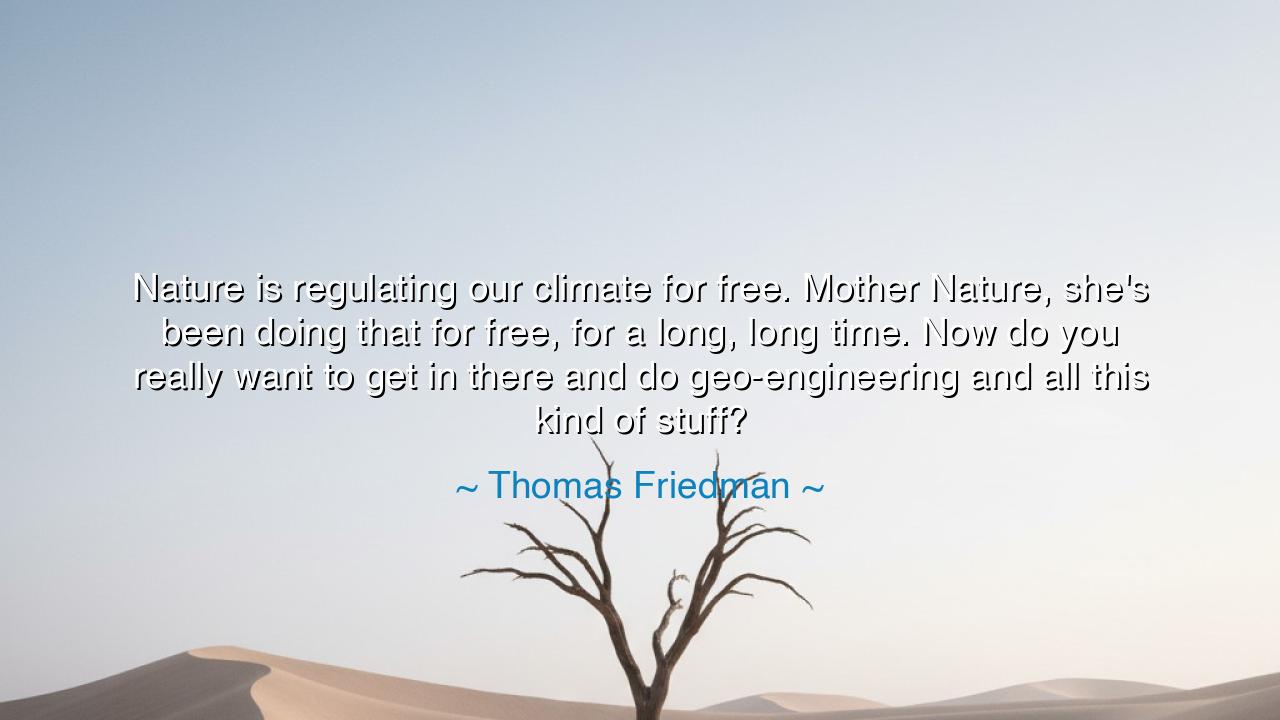
Nature is regulating our climate for free. Mother Nature, she's
Nature is regulating our climate for free. Mother Nature, she's been doing that for free, for a long, long time. Now do you really want to get in there and do geo-engineering and all this kind of stuff?






In the councils of old, the elders taught that the first economy is the living world itself. Thomas Friedman’s charge—“Nature is regulating our climate for free. Mother Nature, she’s been doing that for free, for a long, long time. Now do you really want to get in there and do geo-engineering and all this kind of stuff?”—is a reminder spoken like a riddle at the village gate. He means this: before we minted coins or drafted plans, forests, oceans, soils, ice, and winds already kept the books—absorbing carbon, cycling water, shading heat, brightening clouds, steering currents. The ledgers of the earth have balanced our days without invoice. To forget this and rush to clever contraptions is to reach for a ladder while sawing the branch beneath our feet.
The saying’s origin lies in a generation’s rising unease: that we have pushed planetary systems hard enough to dream up colossal fixes—mirrors in the sky, aerosols in the stratosphere, engines to churn the sea. Friedman’s voice, long tuned to the intersections of markets and ecology, sounds the elder note of caution: begin by honoring what already works at planetary scale. The point is not to sneer at invention, but to rank it rightly. The earth’s free services—wetlands tempering floods, plankton breathing oxygen into air, peatlands storing ages of carbon—are the quiet infrastructure upon which all our bright machines depend.
Consider a true parable from river country. A city once faced foul water and surging costs. Engineers drew up blueprints for a vast filtration complex; ecologists traced the problem to a wounded watershed—forests thinned, farms eroded, wetlands drained. The city chose restoration over concrete: reforest the slopes, fence streambanks, mend marshes. Within years, the river clarified. The price was a fraction; the benefits multiplied—habitat returned, farms steadied, floods softened. Nature regulating our climate—free—is not poetry; it is accounting done in root and stone.
Or look to the sea’s green cathedrals—mangroves and salt marshes—whose tangled roots blunt storm surge and bury carbon in deep, anaerobic vaults. Where they were cleared for quick profit, coasts paid later in grief: villages swept, fisheries hollowed, insurance markets trembling. Where they were replanted, storms arrived to find a living wall, and grief met a gentler tide. Here again the elder math holds: nurture the free shield first; then speak of walls.
This does not mean geo-engineering has no place. The ancients would say: “Do not fetch a lion to chase off foxes.” If, in some narrowed hour, emergency measures can buy time, let them be governed by humility—small, reversible, tested against harms we can foresee—and never as license to keep burning the future. The danger is not experiment; it is arrogance: the gambler’s hope that a last-minute trick will spare us the debt we refuse to pay. Tools may assist; only Mother Nature sustains.
From Friedman’s words, take a clear law of triage. First, protect and restore the free regulators—forests, wetlands, soils, oceans, ice. Second, reduce the fever at its source—cut emissions swiftly, electrify wisely, waste less, share more. Third, innovate as a servant, not a sovereign—design technologies that amplify nature’s work rather than trying to replace it. The best engineering often imitates ecology: cities that breathe like forests, farms that sponge like prairies, buildings that cool like caves.
Let counsel become practice. Plant the long engines—trees where canopies cast shade and roots store rain. Guard blue-green borders—mangroves, marshes, floodplains—so rivers have room to swell without breaking us. Pay stewards to keep carbon in ground—farmers for living soils, fishers for protected nurseries, communities for standing forests. Aim your brightest tools at efficiency and restoration—heat pumps over flares, grids that sip rather than gulp, materials that return to the circle. Do these things first, and when someone offers the sky a silver bullet, you will answer with an older wisdom: the most reliable machine is the one the earth already runs—Nature regulating our climate for free—and our highest craft is to keep it running well.






AAdministratorAdministrator
Welcome, honored guests. Please leave a comment, we will respond soon